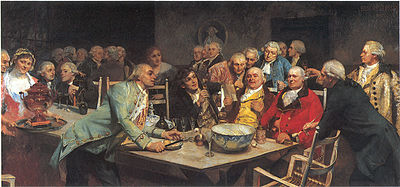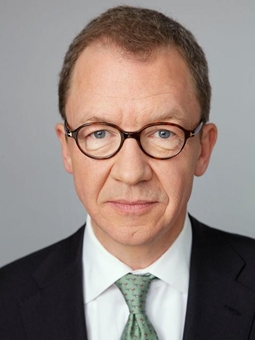One of the last old-fashioned “gentlemen’s clubs” in Norway came under more pressure to join the 21st century on Monday. After years of debate around the all-male Norske Selskab’s refusal to admit women, nearly 30 female opponents of the ban published harsh criticism in leading business newspaper Dagens Næringsliv (DN), and within hours another frustrated leader of the men’s club had resigned.

The Norske Selskab has long been a paradox in Norway, a country otherwise known for being a leader in gender equality. Its name has been translated to “Norway Club” on its own website, and to “The Norwegian Society” in Wikipedia, but it in no way reflects either Norway or Norwegian society of today. Instead it’s a club where neither Norway’s current prime minister, chief justice nor president of the Parliament would be accepted as a member, even if they wanted to join. Nor would the chief executive of large industrial firm Norsk Hydro, or the leaders of the Norwegian Bar Association or the Norwegian Nobel Committee.
They’re all women, and thus unwelcome in Norske Selskab unless they’re invited by a male member to the occasional seasonal dinner where women are allowed entry, or to lunch on the 17th of May. The dress code remains jacket and tie for the men.
The club’s clearly discriminatory membership rules are not illegal, since it’s a private organization, but they’ve been increasingly mocked and challenged. DN reported that at last week’s annual general meeting, held at Bristol Hotel in Oslo and led by club member Morten Thorvaldsen (chief executive of Bristol’s owner, Thon Hotels), the ban on female members didn’t even come up for discussion.
‘Not on the agenda’
“The women-issue was touched upon, but wasn’t on the agenda,” Per Hodneland, partner in the large law firm Bing Hodneland, told DN. There reportedly was some discussion of whether the issue should be discussed, with member and former chief of Norway’s police intelligence agency PST, Jørn Holme, raising the question of whether the club’s roughly 1,200 members should be able to express being either for or against female members on the club’s next annual membership survey. The survey questions everything from the prices in the club’s private restaurant to what members would like in the form of facilities and events.
Holme’s proposal was rejected, with DN reporting that lawyer and former Oslo Mayor Fabian Stang then proposed a vote on the issue. That was also rejected by the roughly 140 members present, on the grounds no such vote was on the agenda.

DN reported that the most recent membership survey taken just a few weeks ago had asked, in general terms, whether there was anything anyone wanted to change in the club. That was interpreted by some as an invitation to bring up the question of women members.
The 63-year-old Thorvaldsen, who carries the title of “foreman” of the club’s direksjonen (now called a styre, or board of directors), was, meanwhile, chosen to handle official response to the media: “This is a private club and an overwhelming majority have expressed that they don’t want to change the club’s form. Beyond that, we have no further comment.”
Several individual and high-profile members seem to disagree. Holme, for example, noted on his way into the meeting last week how Norske Selskab was founded by young liberal Norwegian men who were studying in Copenhagen in the late 1700s when Norway was under Danish rule and had no university of of its own yet. “They stood for the age of enlightenment’s ideals like freedom, brotherhood and equality,” Holme told DN. “Now this is about not only brotherhood but also sisterhood. Many of us think it’s wrong to close off such an association to half of all Norwegians.”
‘Closed forum’ for rich and powerful men
So do the 27 women who wrote their demands in DN on Monday. They include Merete Smith, secretary general of the Norwegian Bar Association, Astrid Bergmål of the travel industry employers’ association Virke Reiseliv and Isabelle Ringnes, a young wealthy entrepreneur who’s also the daughter of real estate investor and art collector Christian Ringnes, an heir to the Ringnes brewery fortune. Christian Ringnes is a member of Norske Selskab himself who also has tried, along with prominent lawyer Cato Schiøtz, to get the club to examine the issue of opening up the club to women. Their efforts were halted almost before they began last winter.
Now the prominent women are speaking up, claiming it would be “naive” to think that Norske Selskab is merely a club made up of friends with zero formal power, and who just like to get together to relax, eat a good meal in elegant surroundings, listen to a speech, play cards around a table or have a chat.

“If this was just a bridge- or clay-pigeon shooting club for men of all rank, it wouldn’t be an issue,” Isabelle Ringnes told DN on Monday. “This is a club where most all the members have important roles in business and who, in a closed forum, have conversations that can, directly or indirectly, contribute to valuable networks and important decisions. It’s naive to think that this type of socializing doesn’t give them advantages outside the closed doors.”
Ringnes was referring to members who include industrialist Kjell Inge Røkke, former retailing tycoon and investor Stein Erik Hagen and male members of the Løvenskiold family (the closest Norway has to nobility). Many other members are also high-profile men with powerful positions, or aspire to be so. Leopold Løvenskiold is so opposed to women joining the club that he proposed the exclusion of Ringnes and Schiøtz last spring, after they’d talked about the controversy within the club on national radio.
The women claimed their appeal this week is mostly meant to express that “inclusion and diversity are important,” and that the exclusion of women makes Norske Selskap “less relevant than ever before.” They noted that many of the companies and organizations for which club members work promote inclusion, so “why should this club be the exception?”
Kreutzer the latest casualty
It didn’t take long for the next in a series of resignations from Norske Selskab by members who now clearly feel uncomfortable with the “men only” nature of the club. Idar Kreutzer, who was elected just last week to the club’s supervisory board, announced his resignation both from the board and as a member of the club on Monday, declaring at the same time that he belonged to the “minority” of members who want to open up for female members.

Kreutzer, former CEO of large Norwegian insurance firm Storebrand, is the head of the financial industry’s trade association and lobby group Finans Norge. He stated in a press release Monday that he normally supports how minority positions can be used to promote change from within organizations. Simply quitting can be seen as the easy way out, he noted, but in this case, the debate over the men-only policy at Norske Selskab was having a “negative” effect on his employer (Finans Norge) “and the members I represent.”
With his own credibility as a promoter of inclusion and diversity at stake, he added that the issue was “taking attention away from the important issues we work with,” and that couldn’t continue. He’d already been challenged in an article in DN last week that highlighted his role at Norske Selskab at the same time he worked for equality and diversity in the finance world.
Violinist Arve Tellefsen and publisher Mads Nygaard have already resigned in protest, as has government minister Nikolai Astrup, who’s from a wealthy family with a financier brother in Switzerland who’s retaining his membership. Membership in Norske Selskab often runs through families, also with sons inheriting membership from their fathers. Tobacco heir Johan Andresen, however, resigned as early as 2013. Investor Ole Jacob Sunde, who also leads the board of the Schibsted publishing firm that owns Norway’s biggest newspapers, reportedly has given the club until the end of the year to include women, or else he’ll resign as well.
Christian Ringnes, who has created a large outdoor sculpture park in Oslo that’s devoted to women, says he still enjoys being a member of Norway’s oldest organization. He told DN that he’s convinced Norske Selskap will open up for women.
“What we’re seeing here is a maturing process,” Ringnes told DN, “on the way from being a gentleman’s club for more than 200 years to being an open club. I absolutely think the time is ripe to draft female membership.” He had rather feared many women wouldn’t be interested in joining, but several, in turns out, seem to be.
NewsInEnglish.no/Nina Berglund

